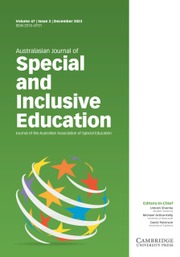Article contents
Benefits and Challenges of a Hybrid Distance Education Program for Autistic School-Age Students: Parent, Student and Teacher Perspectives
Published online by Cambridge University Press: 27 April 2022
Abstract
Parents whose autistic1 child’s needs are not met within mainstream schooling may seek alternative modes of education, such as home or distance education. There is a paucity of research on the delivery of home or distance education programs for autistic students. This study reports on the experiences of parents, students and teachers in the inaugural year of Australia’s first hybrid distance education program (distance education with parent/carers as supervisors) specifically designed for autistic students. Interviews with eight parents, four students and two teachers gathered their perceptions of the program’s benefits, challenges and suggestions for improvements. All parents, students and teachers reported positive overall perceptions of and experiences in the program, and a range of outcomes for students and parents. Flexibility was identified as a key benefit of the program. Challenges identified included a lack of opportunities for students’ social interactions and the effort required of parents to support their child’s participation. Additional longitudinal research is needed to determine the long-term impact of programs of this type and to evaluate strategies for increasing student independence.
- Type
- Original Articles
- Information
- Australasian Journal of Special and Inclusive Education , Volume 46 , Issue 1 , July 2022 , pp. 61 - 73
- Copyright
- © The Author(s), 2022. Published by Cambridge University Press
Footnotes
This manuscript was accepted under the Editorship of Umesh Sharma.
References
- 1
- Cited by


